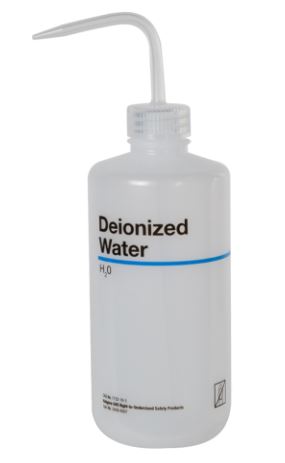WATER, DEIONIZED, 1 l, bot.
Valid Article
WATER, DEIONIZED
Definition
Deionized water is necessary for performing TSH test with the ELISA reader.
Deionized water is also used in reagent preparation, transferring an analyte within a test procedure, as a calibration standard or analytical blank, and for cleaning laboratory equipment.
Deionization removes minerals and ions, both cations (positively charged ions) and anions (negatively charged ions), through a chemical process. The deionizing process (DI) uses specially manufactured ion-exchange which exchange hydrogen ions and hydroxide ions for dissolved minerals, which are then recombined to form water. This leaves deionized water in an unbalanced condition and with an strong electrical charge.
Deionized water does not significantly remove uncharged organic molecules, viruses or bacteria.
Synonym
Specifications
Technical specifications
- CAS n°: 7732-18-5
- Formula: H2O
- Liquid
- Quality: deionized
Packaging & Labelling
1 litre plastic bottle
Instructions for use
Distilled water can be substituted for deionized water, but deionized water should never be exchanged when distilled water is required.
Always check with the manufacturer's instructions before speculating about whether distilled water or deionized water should be used.
Please consult the “Updated laboratory procedures, 2022” available online via the Laboratory working Group sharepoint page: Laboratory Procedures and Resources.
https://msfintl.sharepoint.com/sites/msfintlcommunities/LabWG/SitePages/Laboratory-Manual-page.aspx
For offline access, contact your laboratory advisor.
Precautions for Use
Deionized water is corrosive and should not be used when there will be extensive contact with certain metals.
Storage
If the bottle has not been opened, no expiry date.





![[ELAEELIE3--] ELISA WASHER (BioTek 50TS), 100-240 V, 50-60 Hz](/web/image/product.template/572741/image_256/%5BELAEELIE3--%5D%20ELISA%20WASHER%20%28BioTek%2050TS%29%2C%20100-240%20V%2C%2050-60%20Hz?unique=236d83a)